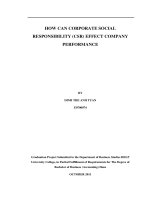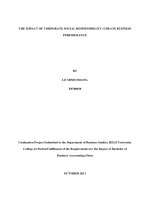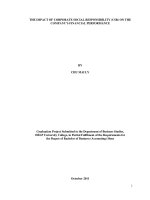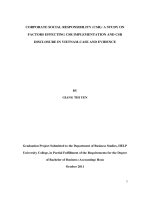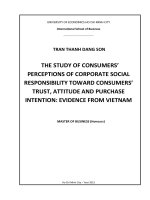corporate social responsibility – csr some theoretical problems and demand for managing changes related to csr in vietnam.
Bạn đang xem bản rút gọn của tài liệu. Xem và tải ngay bản đầy đủ của tài liệu tại đây (611.94 KB, 66 trang )
1
INTERNATIONAL SCHOOL
VIETNAM NATIONAL UNNIVERSITY, HANOI
Graduate project: Corporation Social Responsibility – CSR: Some
theoretical problems and demand for managing changes related to
CSR in Vietnam.
Supervisor: Phan Duc Hieu
Student: Nguyen Thi Huong Mai
ID: 10155367
2
DECLARATION OF ORIGINALITY
AND WORD COUNT
I want to ensure that my graduation project is based on my own original work except for the
quotations which is common with every one. I also declare that my project have not supported
for any courses or programs at Help University College or other universities. The word count
is 12.328 words.
______________________
NGUYEN THI HUONG MAI
10 October, 2010
3
ACKNOWLEDGEMENT
When I did my project, I have received many helps and supports from my teachers, my friends,
my parents. Therefore, I hope to take this opportunity to thank all of them, because without
their supports I may not finish my project on time
Firstly, I would like to thank my supervisor Dr. Phan Duc Hieu, International School, Vietnam
National University Hanoi. He has helped me a lot. He also gave me many useful advices
which help me find the right way to start my project as well as to finish it. I am very grateful
for that.
Additionally, I would like to thank Mr. Tran Le Nguyen, the Vice Chairman of Board of
Director of Kinh Do group, who have participated in my interview to collect information. I
also would like to thank all managers, accountants, consumers and students who have spent
their time to help me do my research. Without their supports I would meet many difficulties in
finding information.
Moreover, I want to express my deep appreciation to my friends and my parents who have
encouraged me a lot during my doing the project. Especially, I would like to thank my mother
who gave me many supports when I did my project.
Thank everyone for always believing in and supporting for me.
NGUYEN THI HUONG MAI
4
CORPORATE SOCIAL RESPONSIBILITY – CSR : SOME THEORETICAL PROBLEMS
AND DEMAND FOR MANAGING CHANGES RELATED TO CSR IN VIETNAM.
By
NGUYEN THI HUONG MAI
October 2010
Supervisor: Dr. Pham Duc Hieu
ABSTRACT
CSR is not a new title in the world as well as in Vietnam, but CSR is still one of the burning
issues in the day. After Vietnam became a member of World Trade Organization (WTO) in
2007, CSR has become even much more important for the country to develop sustainably. This
paper aims to discover the awareness of Vietnam enterprises about CSR and the reality of
implementing CSR into business in Vietnam. Then, this paper also points out some challenges
and theoretical problems of CSR then shows the demands for managing changes related to
CSR in Vietnam.
Vietnam is a developing country and it is also one of the fastest – growing economies in the
world, therefore how to make the country develop sustainably is still questionable. Vietnamese
government has put may efforts in all field to make the country develop sustainably, including
society, economic, culture and critic. From the experiences of developed countries,
Vietnamese nowadays pay more attention to improve both economic and standard of living.
CSR is one of their efforts to make the country develop sustainably. However, the research
5
indicates that although there is a strong support for CSR from managers, consumers,
accountants, a part of them are still lack of knowledge about the importance of CSR.
TABLE OF CONTENTS
DECLARATION OF ORIGINALITY AND WORD COUNT 1
ACKNOWLEDGEMENT 2
ABSTRACT 3
TABLE OF CONTENTS 4
LIST OF FIGURES 6
LIST OF ABBREVIATIONS 7
1. INTRODUCTION 8
1.1. CSR: Where did it come from? 8
1.2.1. Government actions 10
1.2.2. Vietnamese Accounting Standard (VAS) 11
1.2.3. CSR practice and challenges 12
1.3. Reasons for further investigation 13
2. LITERATURE REVIEW 14
2.1. Definition and conceptualization of CSR 14
2.1.1. Carroll‟s 1979-1991 conceptualization 15
2.2. Stakeholder theory 17
6
2.3. Social accounting 18
2.4. CSR reporting 19
3. RESEARCH METHODOLOGY 21
3.1. Research objective 21
3.2. Research methodology 22
3.3. Data source 22
3.4. Research method 23
3.5. Research too 24
3.5.1. Questionnaire 24
3.5.2. Annual report 25
3.6. Data collection 25
3.7. Sampling 26
3.7.1. Sample population 26
3.7.2. Sample frame 26
3.7.3. Sample size 26
3.7.4. Sample techniques 27
3.8. Limitations 27
4. FINDINGS AND ANALYSIS 27
4.1. Some typical corporations 27
7
4.1.1. Domesco Medical Corporation – first prize in the implementation of liability for
workers 27
4.1.2. JSC Pesticides Can Tho (CPC) – Second prize in the field of environmental
protection 28
4.1.3. Vietnam Daewoo Motor Company South-Vidamco – Third prize in the field of
environmental protection 29
4.1.4. Zamil steel building Vietnam Company – Consolation prize of CSR 29
4.1.5. Son Ha Garment Joint Stock Company – received a prize of CSR 29
4.2. Management 32
4.2.1. Finding from questionnaire survey 32
4.2.2. Actual CSR disclosures by firm 37
4.2.3. Finding from managers interview 38
4.3. Consumers 41
4.3.1. Finding from questionnaire survey 41
4.3.2. Overall evaluation of consumer‟s responses 43
4.4 Accountants 47
4.4.1. Findings from questionnaire survey 47
4.4.2. Overall evaluation of accountant‟s responses 49
4.5. Overall discussion 51
4.5.1. Real situation of CSR in Vietnam 51
8
4.5.2. Some theoretical problems and demand for changing 54
5. CONCLUSION 57
REFERENCES 60
APPENDIX A: QUESTIONNAIRE 67
LIST OF FIGURES
Figure 2.1.1. Dipiction of Carroll‟s (1991) CSR pyramid 15
Figure 2.1.2. Comparion of CSR studies using Carroll's pyramid concept 16
Figure 2.2. The pressures influence on company 18
Figure 4.1. Respondents 27
Figure 4.2. Consumer and accountant categories 28
Figure 4.3. Distribution of responses from management survey 30
Figure 4.4. Distribution of responses from management survey (percentage) 31
Figure 4.7. Distribution of responses from consumer survey 38
Figure 4.8. Distribution of responses from consumer survey (percentage) 40
Figure 4.11. Distribution of responses from accountant survey 44
Figure 4.12. Distribution of responses from accountant survey (percentage) 46
9
LIST OF ABBREVIATIONS
CSR Corporate Social Responsibility
CSP Corporate Social Performance
IAS International Accounting Standard
IQR Inter-Quartile Range
MOF Ministry of Finance
NGO Non-governmental Organization
PR Public Relation
TBL Triple Bottom Line
VAS Vietnamese Accounting Standard
VCCI Vietnam Chamber of Commerce and Industry
SMEs Small and Medium – sized Enterprises
VASB Vietnam Accounting Standard Board
RIA Rich Internet Applications
IQR Inventory Quality Ratio
10
1. INTRODUCTION
1.1. CSR: where did it come from?
In the 1970s and 1980s environmental concerns such as loss of rainforest and the effects of
pollution led to a recognition that something had to be done to change the way we were using
the planet resources. As a result, heads of state came together at Rio, Brazil in 1992 for what
was called the Earth Summit. At Rio, governments pledged action to stop the unsustainable use
of resources and to promote sustainable development. For this to happen social, environment
and economic considerations should be assessed together and not in isolation. CSR is now
sometimes considered as the business respond to the challenge of sustainable development. So
11
far, CSR has become more and more popular in the world. The customers now pay more
attention to the origin of the products, they want to know if the products made by harming the
environment, if the products against moral disciplines. Of course, they tend to refuse fringe
foods or the products which are made from animals further. There has a movement which is
shopping with conscience. Many companies, therefore, are aware of the importance of CSR to
get the profit. They take part in many programs to raise charity funds to help the poor, they
improve the environment of work, they participate in programs of decreasing carbon dioxide in
the air, etc. Typically, Unilever, a global company, always ensures that their supplier meet
their expectations on environment and social impacts. The same example is Toyota, a world-
wide automobiles company, also has many activities for community, such as using renewable
energy. Moreover, Levis Strauss, a famous clothes company, is committed to become a zero-
waste company offering customers more sustainable products. Also, TNT, a world-wide
transferring goods and document company, has adopted the international standard ISO 14001
for the purpose of managing and reducing its environmental impact and increasing operating
efficiency. In general, CSR report enclosed with annual business reports appear in most
companies. That is quite good news, but it is only one aspect of the issue. Many commentators,
despairing at the fact that companies have failed to clean up their act despite so many claims of
social responsibility. Even when many companies are aware of the importance of CSR they
still only regard CSR as their task rather than their opportunity.
12
1.2. CSR in Vietnam
CSR was first introduced in Vietnam by international corporations sourcing under the form of
Code of Conduct or Social Standard requirement. As CSR is getting more attention throughout
the world, Vietnam has a great deal left to learn considering that many SMEs in Vietnam do
not really see the importance of CSR. CSR plays a special crucial role in the country‟s
economy when nowadays many of the world largest MNCs are increasingly focus on Vietnam
as the next emerging economy in the Asia Pacific region. The truth is that Vietnam is suffering
from a shortage of skilled labor and an inconsistent legal system and there is a need for
competitiveness and investment in infrastructure. Therefore, to be able to compete in today‟s
global arena, companies must be able to ensure human rights, good labor conditions and safety
requirements, not just provide fast and high quality products. The pollution in Thi Vai river,
contaminated milk and conflict between workers and their bosses are the events proved that
implementing CSR is necessary for Vietnam to develop sustainably.
1.2.1. Government actions
Vietnam government has put many efforts in calling on companies to protect the environment
and promote safety and health in workplace ( Civil Law Network, 2009 ). That plays an
important role in making the country develop sustainably, especially after the Doi Moi reforms
and open-door policies in 1986. Being a developing country, Vietnam can not refuse many
major social problems. The government is aware of that therefore many new regulations,
Environment law, Environment policies, tariff barriers had been created to encourage
companies to produce “clean products”, protect the environment and establish good workplace,
etc. Also, the government takes place annual awards for companies who made much more
13
efforts not only in making good products but also in concerning about labor conditions and
environment impacts, such as the program called “3 R”, including reuse, reduce, recycle. This
program received many attention from both the consumers and the management. CSR-award,
the annual award held by VCCI belonged to Dong Tien Joint Stock Company and Domesco
Joint Stock Company with best CSR practices is also a good example. However, Vietnam
government needs to make more efforts on this issue because of the fact that there is no
requirement from government for the companies to formally issue CSR reporting.
1.2.2. International Accounting Standard (IAS) and Vietnamese Accounting
Standards (VAS)
In February 12, 1999, the Vietnam Accounting Standards Board (VASB) was established by
the Ministry of Finance (MOF). Vietnam has not issued Accounting Standards. Presently,
basing on the International Accounting Standard (IAS), the VAS is set up by the MOF through
the Accounting Policy Department. With the establishment of VAS, accountants have more
tools to work better. It is can not deny that there are still many problems, many argument in
VAS, but the true is that Vietnamese Government have tried their best to help companies
operate their business successfully. However, the shortage in VAS requires more efforts from
government to make it more complete
1.2.3. CSR practice and challenges
A weak competitiveness and lack of investment in infrastructure are two of the biggest
challenges that Vietnamese companies are currently facing. Many efforts have been made to
improve the situation. Vietnamese shoe manufacturers and textile industry began respecting
14
CSR norms of conducts as a result of pressure from MNCs in developed country. Some big
companies also put CSR into their business strategy. Typically, Vinamilk company with the
program “six million glasses of milk for Vietnamese children”, or Ducth Lady Co., with the
program “Den Dom Dom scholarship”. Some SMEs started to pay more attention to CSR. For
instance, HUB café is making a communist library with over 10,000 books in various kinds to
serve customers. “establishing the communist library met many difficulties due to rare
documents or even popular documents but becoming out of date. When all efforts had been
made and the library was already established, the attention of customers is not as expectation
because customers are in habit of chatting while drinking coffee rather than reading books”
says Mr. Truong Giang, the director of HUB cafe company. In general, many companies did
something for CSR, but how many percent of them did because of their volunteer or all they
did because of their image? According to Ms. Nguyen Hong Ha, the general manager of VCCI
in HCMC “the leaders of the companies should do CSR because of their worker first in the
environment of workplace, social insurance, etc, to build a good relationship based on the
belief between the employers and the employees”. Some challenges of implementing CSR in
Vietnam are that there are still gaps between national labor code and CoCs, there is a lack of
law enforcement, lack of cooperation, lack of understanding of the benefits from the
application of CSR at factories, lead to the lack of support from employers. To overview,
although Vietnamese enterprises had made many efforts on implementing CSR, they still meet
many challenges, not only at national level, industry level but also at corporate level
1.3. Reasons for further investigation
.CSR is the hot issue nowadays in every part in the world. Vietnam is integrating into the
global economy, so the country must improve its competitiveness not only through good
15
products but also through good environment. That why CSR should be received much more
attentions and actions from the government and companies. This paper aims to discover how
the companies do to implement CSR in Vietnam then show some theoretical problems and the
demand for managing changes related to CSR in Vietnam. As such it does not claim to have all
the answers and invites open exchange.
2. LITERATURE REVIEW
2.1. Definition and conceptualization of CSR
The term “CSR” came into common use in the early 1970s, after that there has been an intense
debate among academics, consultants and corporate executives to find a definition of a more
human, more responsible and more transparent way of doing business, then some definition of
CSR were introduced. But with the same definition, CSR is understood differently in different
countries, even with different people.
The definition of CSR provided by the Commission of European Communities is one of the
most frequently cited definition. It defines CSR as “a concept whereby companies integrate
16
social and environmental concerns in their business operations and in their interaction with
their stakeholders on a voluntary basis. Being social responsible means not only fulfilling
legal expectations, but also going beyond compliance and investing more into human capital,
the environment and the relation with stakeholders” (Deegan, 2009).
In brief, the concept of CSR has been evolved considerably since it first emerged in the 1950s
(Carroll 1999; Freeman 1984:38; Carroll and Beiler 1977; Sturdivant 1977). As a result there
appears to be disagreement about what the term means, whether it should be implemented,
how it should be implemented or why it should be implemented (Welford 2004; Stigson 2002).
In this paper, one concept of CSR will be introduced. It is the most famous conceptualizations :
Carroll (1979) four-part definition of CSR.
2.1.1. Carroll's 1979-1991 conceptualization
Carroll(1979) categorized CSR in a paper on corporate social performance, along four layers
which he labeled economic, legal, ethical and discretionary responsibilities. He indicates that
providing goods and services and making profit are the principle roles of business
organizations, then emphasizes on legal aspect and later concern for ethical and discretionary
aspects. In 1991, his first CSR model as a pyramid was introduced, as shown in the following
figure. According to Carroll, the management‟s identification of the issues that are most
importance to firms in a given time is necessary for high corporate social performance.
17
Figure 2.1.1 Dipiction of Carroll‟s (1991) CSR pyramid
Another study tested Carroll‟s CSR pyramid for a sample of 503 large Black-owned business
in the U.S., suggesting the importance of culture (Edmodson and Carroll, 1999). The survey
found that while the economic component was rated as philanthropic and legal responsibilities
was relatively small. A further study with a culture dimension compared the views of 165
Hong Kong and 157 U.S. students on CSR and found that Hong Kong students emphasized
economic aspects more strongly than their U.S. counterparts and gave no difference in
weighting between legal and ethical dimensions of CSR (Burton, parh, & Hegarty, 2000).
Studies
Mean values
Economic
orientations
Legal
orientations
Ethical
orientations
Philanthropic
orientations
18
Aupperle, Carroll &
Hatfield (1985)
3.50
2.54
2.22
1.30
Pinkston & Carroll
(1994)
3.28
3.07
2.45
1.15
England
3.49
3.15
2.29
0.98
France
3.60
3.04
2.35
0.98
Germany
2.86
3.21
2.46
1.42
Japan
3.34
2.76
2.42
1.41
Sweden
3.27
3.30
2.43
1.00
Switzerland
3.11
3.04
2.70
1.10
USA
3.11
2.96
2.48
1.19
Edmondson & Carroll
(1999)
3.16
2.12
2.19
2.04
Burton, Farh &
Hegarty (2000)
-
-
-
-
Hong Kong
3.11
2.32
2.32
1.84
USA
2.81
2.42
2.51
1.99
Table 2.1.1: Comparison of CSR studies using Carroll‟s pyramid concept
The complex business environment that is faced by organizations nowadays implies the need
for and important of on-going stakeholder management. The Stakeholder Theory is discussed
in the next section.
2.2. Stakeholder theory
In fulfilling their CSR obligations, firms might be expected to engage with their stakeholders,
an activity that may be labeled stakeholder dialogue to determine what might be appropriate
business behavior under each of the three headings (O‟Riordan, 2006). Many definitions of
stakeholder have been introduced, in brief, stakeholder can be understood as “any identifiable
19
group or individual who can affect the achievement of an organization’s objectives, or is
affected by the achievement of an organization’s objectives”(Freeman and Reed, 1983). Ethical
and managerial are two branches of stakeholder theory. The ethical branch of stakeholder
theory indicates that all stakeholders have the right to be treated fairly by an organization and
issues of stakeholder power are not directly relevant. So management should manage the
organization for the benefit of all stakeholders. On the other hand, managerial branch of
stakeholder theory attempts to explain when corporate management will be likely to attend the
expectations of particular (powerful) stakeholders. In this branch of stakeholder theory,
organization will not respond to all stakeholders equally, but to the most powerful. Managers
should understand the two branches of the stakeholder theory to be one or the other of the
absolute extremes of the ethical or managerial branch. Companies are under pressure of
internal and external stakeholders as shown as below.
Table 1: the presures influence on company
Figure 2.2: The pressure influence on a company
20
Then, to make CSR more popular to the stakeholders, both managers and accounts need to
have a full knowledge about stakeholder theory as well as the importance of CSR.
2.3. Social accounting
Social accounting is not a new concept – it has been around for decades (Sustainability 1999).
Then we can understand social accounting as “Social accounting is about understanding the
impact of organizations on our society…the overarching context is…sustainability: both
sustainability of the organization itself (the interrelation of the social, the environmental, the
cultural and the financial) and sustainability of behavior which contributes to a future for the
people and the planet” (Pearce 2001). Everybody can realize that any actions an organization
undertakes influence not just itself but also may influence other with which it interrelates. It
may include the business environment in which the firm is operating, local community, and the
wider global context. These influences can be significant, multiple, and ambiguous. In some
countries social reporting as a legal requirement. For instance, in France companies with over
300 employees are required to produce a social report. In the UK a regulation on Pension
Funds “requires trustees to state the extent to which they have taken the environmental and
ethical considerations into account in fund management” (New Economics Foundation 2000).
The themes of social and environmental accounting have increased the complexity of the
traditional view by including both internal and external stakeholder, along with a
multidimensional view of performance (including the non-financial values).
So, the essential features of social accounting are, firstly, an endeavor to report the effects of
the operation of the firm upon the society; secondly, focused on stakeholders external to the
21
firm; and thirdly, voluntary. So the audience of the report and the voluntary nature are two
components that distinguish social accounting from traditional accounting.
2.4. CSR reporting
“CSR reporting is now an expectation of business and large organizations really have no
choice” Paul burke of Acona, an independent consultancy that advices clients on reporting
observes. Many other people also agree with this statement. Because the benefits from CSR
reporting are undeniable. That why many big corporations all over the world have create their
own CSR reporting, they also put their CSR reporting on their own websites to let stakeholders
know exactly what they have done during the period of time. CSR reporting is the most useful
mean to help companies communicate with their stakeholders.
Nowadays many Vietnam companies are considering taking to CSR reporting. The conflicts
between owners and employees require more tools to solve. And it is believable that when
owners are more friendly with employees, they will be able to talk with each other every
things, then the conflicts will disappear. By using CSR report, owners and employees are
getting closer, then the offices will become more comfortable place for every one.
From experiences of developed countries, Vietnam can apply CSR very easy. There are also
guidance for accountants to build CSR reporting. There are also many models for CSR
reporting, such as SA 8000, AA1000, ISO 14000, GRI, etc. So, corporations can use one of
those models to build their own CSR reporting. Besides, there are also many training programs
to let accountants know how to make a perfect CSR reporting which stakeholders can believe
in.
22
To overall, applying CSR into business is important, making CSR reporting is much more
important. Many countries in the world have implemented CSR and made CSR reporting, so
there are many conveniences for Vietnam corporations to learn from them.
Although there is still some problems in implementing CSR in Vietnam, with the aim of
learning from other countries, Vietnam corporations will be able to develop sustainably in the
near future.
3. RESEARCH METHODOLOGY
3.1. Research objective
The paper aims to find the origin of CSR. Besides it aims to find the reason why CSR came
into Vietnam. The research also takes a look on the performance of companies on CSR issue.
Then, prepare the awareness of management and the reality they apply CSR into their business.
Moreover, the research purposed to discover the level of customers‟ awareness about CSR,
whether they care about CSR, and whether CSR has impact on their purchasing decision. And,
the research also find out the importance of implementing CSR into business as well as its
benefits to consumers, companies, shareholders, etc.
23
3.2. Research methodology
I did this research with the support from the interview between me and many managers,
accountants and consumers
3.3. Data source
To meet the information needs, there is necessary to gather both secondary data and primary
data.
3.3.1. Secondary data
Secondary data is the data that have been already collected by and readily available from other
sources. That data are cheaper and more quickly obtainable than the primary data and also may
be available when primary data can not be obtained at all. Secondary data can be internal or
external to the organization and accessed through the internet or perusal of recorded or
published information. It helps to make primary data collection more specific since with the
help of secondary data, we are able to make out what are the gaps and deficiencies and what
additional information needs to be collected. However, secondary data is something that
seldom fits in the framework of the marketing research factors. And sometimes the accuracy of
secondary data is not known or the data may be outdated. Because of the above mentioned
disadvantages of secondary data, we will lead to evaluation of secondary data. Evaluation
means the following four requirement: availability, relevance, accuracy, sufficiency must be
satisfied. That forces the researchers must evaluate it very carefully.
24
3.3.2. Primary data
Primary data is the specific information collected by the person who is doing the research. It
can be obtained through clinical trials, case studies, true experiments and randomized
controlled studies. Primary data is important for all areas of research because it is unvarnished
information about the results of an experiment or observation. It is like the eyewitness
testimony at a trial. No one has tarnished it or spun it by adding their opinion or bias so it can
form the basis of objective conclusions. However, primary data is usually expensive and time
consuming. Additionally, if it is not conducted properly, the false result will be created.
Moreover, obtaining primary data requires skill and expertise of researchers, which matters a
lot.
3.4. Research method
This research mainly based on primary data. Besides, secondary data also supported to
overview the reality of implementing CSR. Both secondary and primary play an important role
in finishing the research.
3.5. Research tool
3.5.1. Questionnaire
In this research, I use information from survey (Appendix A). the survey was done with three
patterns, they are managers, consumers and accountants. The interview with the manager has
25
been made with 6 questions (in appendix A). those questions mainly aims to find out the
attitude of the managers toward implementing CSR into their business and the reality situation
of implementing CSR in their business. The survey for the consumers has 7 questions in the
table in chapter 4. They are divided into two parts: the attitude toward CSR and the statement
that consumers support for CSR. The survey for the accountants has 8 questions in the table in
chapter 4. These questions are also divided into three parts: the attitude toward CSR issue,
perception of CSR reporting and the view of the importance of CSR. All of three survey
patterns use five-points Likert scales (1= “strongly disagree”; 5= “strongly agree).
3.5.2. Personal interview
Managers from some companies have taken part in the interview. There are 7 main questions
and many addition questions prepared to ask the. The interview aims to find out the current
CSR practice of companies.
3.5.3. Annual reports
I do research based on annual report of 10 companies. Those annual reports show the activities
that corporations have made through many years.
3.6. Data collection
The project mainly based on my primary data. The question survey has been made with people
at Cau Giay District in Hanoi, students of International School, Vietnam National University
Hanoi (IS – VNU), the consumer in some grocery stories and many accountants of many
different companies. The secondary data also find in annual reports of some big corporations.



